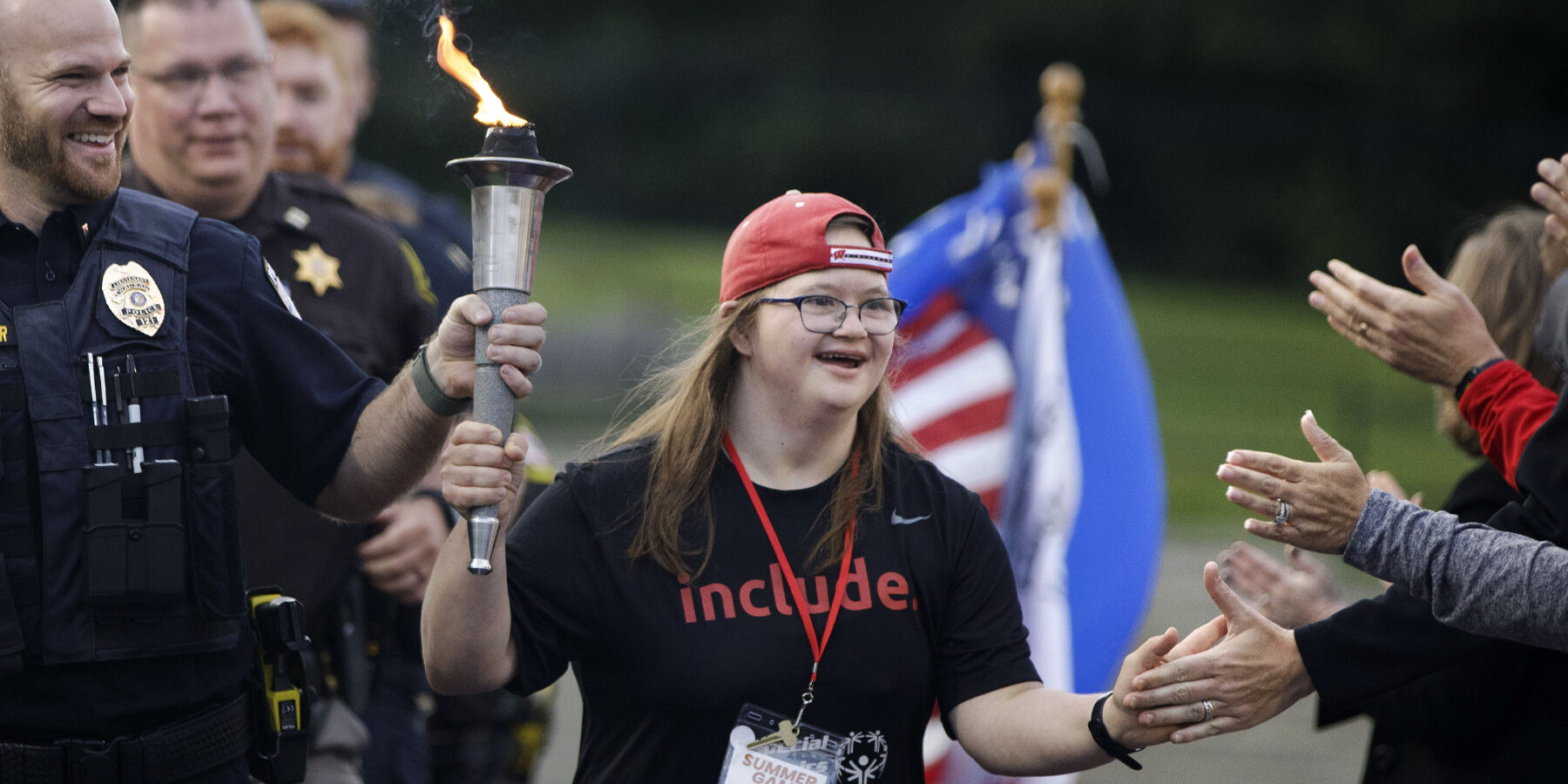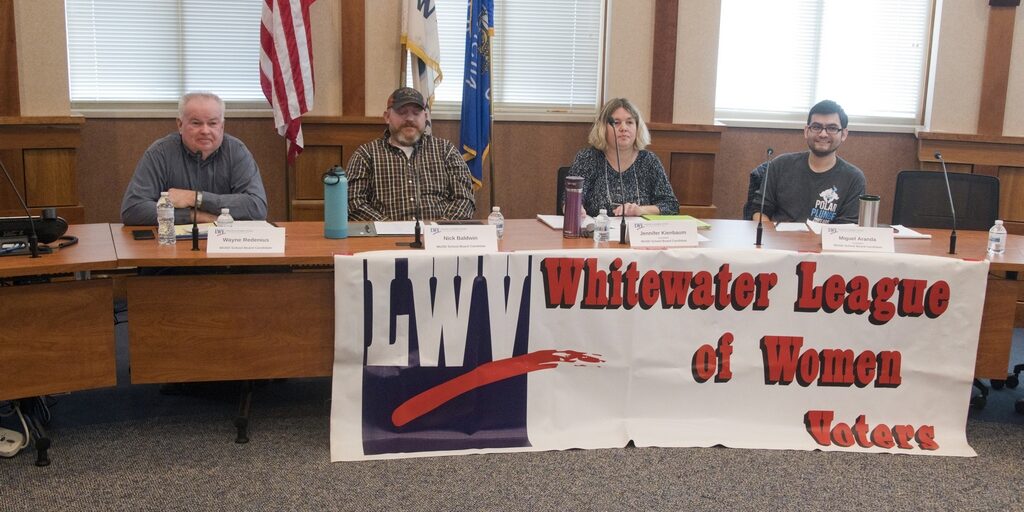By Lisa Dawsey Smith
Whitewater Banner Staff
whitewaterbanner.com
At the Common Council meeting of June 16, Council President Lynn Binnie introduced a Resolution in Support of Racial Justice, indicating that he felt it was a necessary step in responding to the nationwide protests, as well as local calls for reforms in the practices and culture of policing. While expressing gratitude that the local protests have been peaceful, Lynn indicated that a number of our citizens are raising concerns about racial injustices in our own city, and are insisting on systemic change. “Perhaps that has come rather unexpectedly to my peers, to City leadership, and to citizens who are listening. In my tenure on the Council I remember very few concerns being raised in terms of discrimination or unfair treatment. You may feel the same,” he stated. He pointed out that our city leadership, both elected and professional, is unfortunately very lacking in racial/ethnic diversity, and maintained that it is impossible for those people to fully understand the perspectives of people of color.
Binnie concluded, “That’s why I felt it was imperative for us to consider a resolution on racial justice tonight. But that’s not enough. That’s why it’s time for us to be deliberate about listening. And that’s why it’s time for us to be committed to change. A resolution is only a starting point. That’s why after we discuss the resolution we will be talking about action steps.” He expressed appreciation for assistance in drafting the resolution to Council member Brienne Brown and to Dr. Kenny Yarbrough, Chief Equity, Diversity and Inclusion Officer at UW-W. The resolution that is copied below was adopted unanimously by the Common Council.
After the meeting The Banner asked Binnie how he felt about the 3+ hour meeting. He responded, “I was very pleased by the affirmative response of my peers, and of the numerous citizens who spoke, to the resolution. The comments by City Manager Cameron Clapper and Police Chief Aaron Raap demonstrated that, although many of our policies already address many of the concerns that are being raised nationally, they recognize the importance of intentionally listening to the community and committing to changes wherever they are needed. Recently I heard the adage, ‘culture trumps policy every time,’ and we have to be open to culture change in addition to policy change. Finally, I was extremely disturbed to hear the abhorrent things that some of our own citizens have done towards people of color in the course of daily life as well as during the current protests. It falls far short of what we desire for Whitewater, and I hope that all of us will take a good look in the mirror and consider how we treat our fellow citizens.”
Resolution in Support of Racial Justice
WHEREAS, the Declaration of Independence provides in part that “all men are created equal, that they are endowed by their Creator with certain unalienable rights, that among these are Life, Liberty, and the Pursuit of Happiness”; and,
WHEREAS, the 14th Amendment to the United States Constitution guarantees that no person within the jurisdiction of the United States shall be denied the equal protection of the laws of the United States; and,
WHEREAS, the City of Whitewater recognizes that these rights were originally intended for a selected category of the United States population but have evolved to include all citizens of the United States; and,
WHEREAS, it is the goal of the City of Whitewater to be a welcoming, affirming, and inclusive community; and,
WHEREAS, the City of Whitewater intends to provide efficient and high-quality services which support living, learning, playing, and working in an exceptional community; and,
WHEREAS, the City of Whitewater is strengthened by and thrives upon the rich diversity of its residents’ identities which include: racial, ethnic, cultural, gender, gender expression, persons who are differently-abled, and various sexual identities, all of which contribute to the vibrant character of our City; and,
WHEREAS, it is the intent of the City that no person be denied the equal protection of the laws; nor shall any person be denied the enjoyment of his, her, or their civil rights or be discriminated against because of their actual or perceived characteristics of race, color, ethnicity, national origin, or any other identity; and,
WHEREAS, the City has demonstrated this intent by establishing an Equal Opportunities Commission, and by various actions of the Police Department, including: voluntary compliance with the extensive standards of the Wisconsin Law Enforcement Accreditation Group, being one of the first law enforcement agencies in the state to provide body cameras for officers, providing recent cultural sensitivity training sessions for officers, and participating in recent community forums with representatives from the Latinx community as well as the UW-W Black Student Union; and,
WHEREAS, our nation’s history is replete with shameful acts of injustices and discrimination towards people of color, beginning with slavery and continuing in various ways to today; and,
WHEREAS, over that history our nation’s various communities of color and their allies have directed our attention to these failures, calling for equal justice and fair treatment; and,
WHEREAS, in recent days millions of our citizens nationally and hundreds of our own City’s citizens have responded to recent tragic events of injustice, including loss of life, by protesting and calling for change; and,
WHEREAS, we recognize that in spite of our best intentions, we may be unaware of ways or instances in which our City’s services fail to reflect our core values; and,
NOW, THEREFORE, WE, the Whitewater Common Council, do hereby resolve that the City of Whitewater, Wisconsin:
1. Reaffirms its commitment to equal and fair treatment and justice for all citizens and visitors, and states its strong opposition to systemic racism affecting people of color in this and every other community in the United States of America.
2. Encourages any individuals who believe that they have been mistreated or discriminated against in the course of any City services to file a complaint with the appropriate Department Director, the City Manager, a Common Council member, or the Equal Opportunities Commission.
3. Requires that any complaints be fully investigated with any appropriate corrective action being taken and, to the extent allowed by our Human Resource policies, the results being communicated to the complainant.
4. Commits to opportunities for dialogue and discussion between all interested parties with Common Council members and City leadership regarding concerns and suggestions pertaining to equal justice and fair treatment in any policies and practices of the City. Although it is recognized that racial justice issues may arise primarily in the Police Department and the Municipal Court, we do not wish to exclude discussion of issues related to any City services.
5. Commits to thorough evaluation of concerns, suggestions, and recommendations received, with timely action steps that may include adoption or revision of policies and procedures, personnel education, evaluation of outcomes, and transparency in these actions.
6. Commits to reforms and culture change.
**********************************************************************************************************************
Following the adoption of the resolution, before he discussed next steps, City Manager Cameron Clapper shared some personal comments, indicating that there had been some recent inadvertent missteps in communication from the city staff as they have addressed racial justice. Specifically Mr. Clapper mentioned that at the June 7 March for Racial Unity he had been emotional in noting the strong turnout, and in struggling to get words out followed “Black Lives Matter” with “All Lives Matter.” Cameron referenced a comment that someone made to him since that march: “Until Black Lives Matter we can’t say that all lives matter.” He then stated that he wholeheartedly retracted the “all lives matter” statement, indicating that he was titling his remarks “commiting to racial justice,” because he sees it as a process.
Mr. Clapper also expressed that he was very disappointed to hear of some of the very offensive things that have happened to individuals who are peacefully expressing their right to free speech in Whitewater.
The examples of “radical transformative change” that have been communicated as needed in the Police Department by some of the local protesters are consistent with those found at https://8cantwait.org. The City Manager enumerated each of the eight goals that have been expressed, together with an explanation of Whitewater’s current policies.
- The duty to intervene-Require officers to intervene and stop excessive force used by other officers and report these incidents immediately to a supervisor. Response: This is Whitewater policy.
- Ban shooting at moving vehicles- this practice has been shown to be ineffective and jeopardizes the safety of citizens Response: Our policy only permits shooting at moving vehicles in very limited circumstances. An officer must exhaust all other options, and would only be permitted to shoot at a moving vehicle if necessary for the safety of surrounding individuals or the officer.
- Require a use of force continuum- develop a force continuum that limits the types of force and/or weapons that can be used to respond to specific types of resistance. Response: Our policy and training are modeled after the use of force continuum from the Training and Standards Bureau of the WI Department of Justice.
- Require comprehensive reporting- Require officers to report each time they use force or threaten to use force against civilians. Response: This is our policy, and such instances are reviewed by four officers in the chain of command, up to and including the Deputy Chief or Chief. City Manager Clapper indicated that he anticipates discussion about requiring review outside the department when there is an accusation of excessive force or racially motivated actions.
- Exhaust all other means before shooting- require officers to exhaust all other reasonable means before resorting to deadly force. Response: This is our policy. Before use of any type of force an officer must attempt to use verbal commands and nonverbal cues.
- Require a warning before shooting-require officers to give a verbal warning, when possible, before shooting at a civilian. Response: Officers are trained to clearly and loudly communicate with the subject before using deadly force whenever possible.
- Require de-escalation-require officers to de-escalate situations, when, possible by communicating with civilians, maintaining distance and otherwise eliminating the need to use force. Response: Our policy is designed to eliminate the need for force, and when force is required to gain control, the level of force must be reduced once control is gained.
- Ban chokeholds and strangleholds-Allowing officers to choke or strangle civilians, in many cases when less lethal force could be used instead results in the unnecessary death or serious injuring of civilians. Response: Chokeholds are not authorized, nor are they part of our training. They would only be appropriate if an officer’s life was threatened.
Although Clapper summarized that most of our policies are in accordance with what is being described as best practice, he recognized a need for more open dialogue, for explanations, and for corrective action. A citizen told him this week, “Resolutions and proclamations are fine and good, but people watch action.”
Clapper indicated the following plans for action:
- Regular town hall meetings
- City Manager reports will provide updates on related initiatives.
- The quarterly Police Department report format will be reviewed for greater transparency.
- The Equal Opportunity Commission will change from a reactive to a proactive, standing committee charged with ensuring that the city’s policies and practices are free of systemic racism. People of color will be well represented on the commission.
- Diversity training will be provided more regularly.
- Our personnel recruitment will be focused on increasing diversity.
- Increased investigation of complaints, to include City Manager review of any allegations of excessive force or racial injustice.
- Any citizen who feels that they have been unfairly treated by any city employees is encouraged to file a complaint with the City Manager, the Police Chief, the Equal Opportunity Commission, or a Common Council member.





















